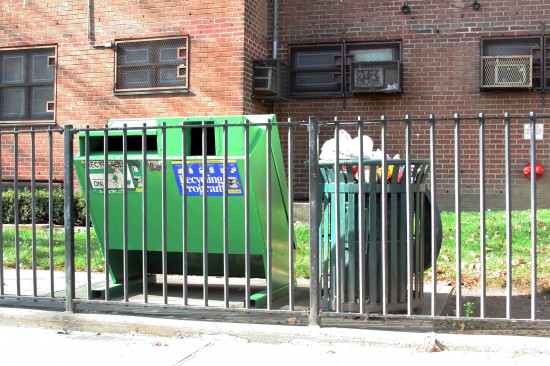
Housing Authority facilities make recycling difficult
Glass, metals, apple cores: It’s all the same to Mott Haven residents, according to a report published in the Daily News on Oct. 4. Citing confusion and lack of space for recycling, the report, based on Sanitation Department figures, pegs the recycling rate for Mott Haven, Port Morris, and Melrose as the worst in the city.
Only 16 percent of what should be recycled is, according to the report, compared to the citywide average of 42 percent.
“We don’t have recycling here,” said Princella Jamerson, who has lived in the Mill Brook Houses for 35 years. “We had cans outside for recycling, but people put all of their trash there.”
How much is recycled in the area depends in large measure on the New York City Housing Authority, which operates 17 public housing projects, including Mill Brook, here.
“The Housing Authority tries,” said Andrew Jackson Houses Residents Association president Danny Barber. “But it’s also the people. You have to educate the residents.”
The law requires city residents to sort their trash, putting glass, plastic and metal, paper items and food garbage into separate containers.
Housing Authority spokesman Howard Marder said that efforts are being made to inform residents of their recycling duties.
“We distribute literature, we speak at resident association meetings, we speak with the staff so they know what to do,” said Marder. “If a location needs more receptacles and more signs, we want the staff to tell us and we will provide them.”
When a residential building does not recycle its trash, owners are punished, but tenants are not. For landlords of small private apartment buildings, fines serve as an incentive to recycle. Gregorio Sanchez, a landlord of three units on East 157th Street was once lax about recycling, but an enforcement agent prodded him to be more careful.
“I once got a ticket; it was a black bag kicked by a Sanitation agent,” said Sanchez. “He heard broken glass inside.”
For having glass mixed with his regular trash, Sanchez was fined $25. He could have challenged it, arguing that the glass vase inside was broken into pieces when disposed, but citing a busy work schedule, he paid the ticket.
To prevent future fines, Sanchez put up signs for his tenants, and sweeps his sidewalk. “If we don’t pick it up, they ticket us,” he said.
Even though the Daily News report is based on a Sanitation Department survey from July 2009, Robert Lange, director of the Sanitation Department’s recycling program disputes the recycling report. “It is accurate, but other factors need to be considered,” said Lange.
“No city, recycles everything,” Lange said. Inevitably, some paper, plastic and glass can’t be recycled because the items have been used to store food or clean up after pets.
The best any city has achieved, Lange said, is to divert 55 to 60 percent of its paper, plastic, glass and metal for re-use, instead of burial in landfills.
That still exceeds the 16 percent recycled locally, and Lange believes that local residents have the potential to increase their recycling by a further 30 percent, bringing it closer to the citywide average.
Because private companies collect their trash, commercial properties are excluded from the Sanitation Department’s surveys, but local business owners who belong to The Hub Business Improvement District have their own street cleaners along Third Avenue and East 149th Street.
“My sanitation guys sweep and service the streets,” said Vinnie Valentino, the BID’s executive director. On the corner of Third Avenue and East 149th Street, there are two recycling containers, in a pilot program for recycling in BIDs.
Private housing developers have also taken steps to ensure a better environment. Nos Quedamos, a Melrose-based community development corporation, is the sponsor behind 12 projects consisting of multi-family townhouses and apartment buildings.
“We assisted homeowners along Elton Avenue in securing recycling receptacles from the Department of Health,” said Anna Vincenty, the assistant director of community relations at Nos Quedamos. “Among older buildings, there are special receptacles to keep rats out.”
Alongside its older dwellings, Nos Quedamos also manages recently-built apartment house for seniors and working families. The organization promotes recycling vigorously.
“This happens in all of our buildings,” said Vincenty. “People don’t know what to recycle, so we have seminars.”
Nos Quedamos buildings have recycling rooms with trash chutes on every floor of the properties it manages. NYCHA projects that predate the recycling law only have trash chutes in their hallways. As a result, in order to dispose of their recyclables, residents must go outside and look for special green bins.
“They should have indoor trash recyclables,” said Mitchell Houses resident Mark Scott, 22. Looking at the outdoor green recycling container, Scott said it was unrealistic to expect every resident to recycle, especially during the winter months.
Inside Scott’s apartment building, which was built in 1966, the hallways are too narrow to accommodate a new room for recyclable trash.
“The fire code prohibits storage of anything in hallways or interior entranceways,” said Marder. “Therefore in order to recycle, residents have to leave the building.”
Nevertheless, Marder said that residents can make a difference in improving their communities. In August, the Housing Authority announced the formation of “green committees” for each Housing Authority development. Thirty-eight projects around the city have them, including Mott Haven, Patterson and McKinley.
“It seems simple,” said Anthony Bonilla, 27, a lifelong resident of Mott Haven Houses. “More education needs to be done.”
A version of this story appeared in the Winter 2009 edition of the Mott Haven Herald.

[…] Mott Haven flunks Recycling 101 (Mott Haven Herald) […]